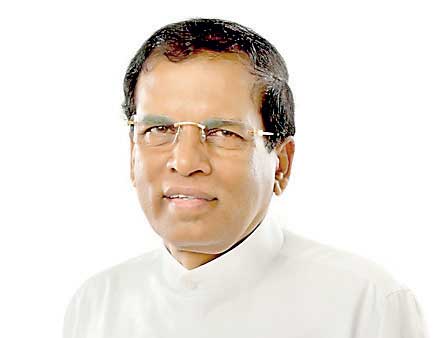Saturday Feb 14, 2026
Saturday Feb 14, 2026
Wednesday, 19 August 2015 00:52 - - {{hitsCtrl.values.hits}}
Uncompleted mandate
It was not possible to complete the constitutional reform agenda of the Common Candidate, now President, Maithripala Sirisena, before the dissolution of the seventh Parliament of the Republic. 
With regard to electoral reforms, his commitment was: “I guarantee the abolition of the preferential system and will ensure that every electorate will have a Member of Parliament of its own. The new electoral system will be a combination of the first-past-the post system and the proportional representation of defeated candidates. Since the total composition of Parliament would not change by this proposal, I would be able to get the agreement of all political parties represented in Parliament for the change. Further, wastage and clashes could be minimised since electoral campaigns would be limited to single electorates.”
This is mandate enough, but the manifesto of the victorious UNP reinforces it thus: “The preferential voting system will be abolished and a system combining proportional representation (PR) and an electoral system will be established.”
The UNP also promises to control election expenditures.
But our representatives and assorted others ha ve been talking about electoral reforms since 1996 with little to show for it. The President demonstrated the seriousness of his commitment to electoral reform going so far as to postpone the dissolution of the seventh Parliament beyond its useful life. He now must give leadership to the new Parliament so it completes his Constitutional agenda.
ve been talking about electoral reforms since 1996 with little to show for it. The President demonstrated the seriousness of his commitment to electoral reform going so far as to postpone the dissolution of the seventh Parliament beyond its useful life. He now must give leadership to the new Parliament so it completes his Constitutional agenda.
It is possible that representatives who got elected to Parliament through the present flawed system may not want to change the system that brought them to Parliament. It is also possible that the strong public support that has existed for electoral reforms will ebb in light of the experience of what was possibly the most lawful election in Sri Lankan history.
But it is important that the reforms be completed because the particular confluence of factors that made it possible to properly enforce laws in this election may be unique. One hopes that the public service will continue to function without fear or favour, but they could do with some help from the Constitution.
Reform without diversion
Sri Lanka cannot retreat from the present method of determining Parliamentary representation in a manner that reflects the actual votes. Proportional representation will remain. Any proposals for replacing the hated preferential voting procedure will have to meet a twofold test: will it reduce the costs of campaigning and will it create pressure on candidates to obey the law, especially with regard to expenditure?
These are the two main problems we seek to address by abolishing the preferential system. Any solution that fails to meet these tests should be rejected.
Take for example, the dual-ballot proposal, promoted among others by the UNP Treasurer and MP Eran Wickramaratne. Parties drawing support from geographically dispersed ethnic or ideological minorities will campaign across the entire electoral district if the dual-ballot system allows them to elect members through the party ballot. Parties that are capable of winning the first-past-the-post (FPP) contests will also range across the district collecting “non-minority” votes and even stoking anti-minority passions.
If we introduce the dual ballot in the name of some misguided homage to “best practice” there will be no change in candidates having to conduct expensive campaign across large areas. Those elected by the party ballot would be practically immune to election petitions initiated by their direct opponents, as has been the case since 1978. Enforcement of election law will thus depend solely on the dedication of the Elections Commission. We will recreate the problem we sought to eliminate. The dual-ballot system fails by both tests.
Mr. Wickramaratne, in an interview published in the Island on 27 June 2015, identifies the campaign finance and violence problems as those associated with law and order and questions their relationship to electoral reforms.
This is strange coming from one educated in business and economics. If the underlying incentives compel candidates to range across large electoral districts they will indeed do so and collect funds from whatever available sources, irrespective of the law. Asking the elections commission and the police to enforce laws may give one a good feeling but it will not yield good results unless the underlying incentives are addressed.
Enforcing the law
On the subject of enforcement, I like to think in terms of how competition or anti-trust laws are enforced in the US. If you violate competition law, you can expect to be challenged in two ways. First, the government may take you to court. These are expensive and highly complicated cases and it’s not certain that the commitment of the authorities will be constant throughout the duration of the case. If an aggrieved party does not want its fate to be decided solely on the basis of the diligence and commitment of government officials, there is a second path.
Here, an aggrieved competitor will collect evidence, assemble experts and launch a private anti-trust case. It is riskier and more expensive, but if successful, it yields triple damages. In the 1970s, MCI, the challenger in the long-distance telecom market, had so much success with this kind of litigation that income from damages levied from the dominant player AT&T exceeded their telecom revenues at one point.
This was how adherence to election law was maintained in Sri Lanka prior to 1978. Aggrieved defeated candidates had incentives to collect evidence and launch election petitions against winners who they believed had violated elections law. Two members of the first post-independence cabinet lost their seats this way. The successful petitioner could expect to win the resulting by-election, or at least have an advantage (the equivalent of triple damages in competition law). Under the PR system, defeated candidates have no incentives to initiate election petitions (except in the case of the Presidential election, which is a conditional FPP election) because there are no by-elections.
A mixed-majoritarian, single-ballot system that reintroduces FPP and appoints additional persons to ensure the desired representation proportional to votes received from among the ranks of defeated candidates meets both tests. It brings back the discipline of the election petition. Even if a petition is not launched, the very threat will cause candidates to respect the law.
So let us build on the considerable progress made during the extended 100 days. Let us keep in mind the problems we are seeking to solve and not get distracted by dual ballots and similar ill-considered diversions. The President should lead, we will support.